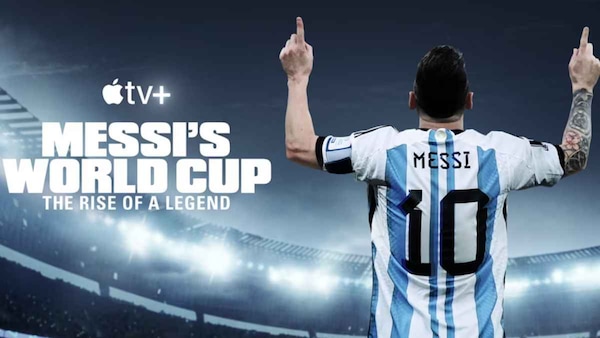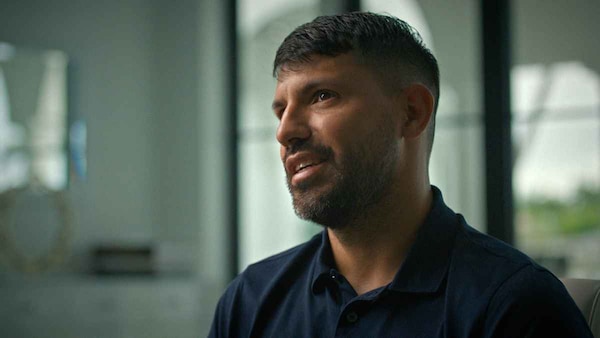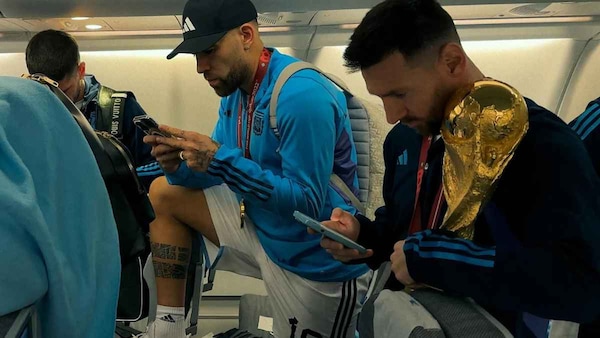Messi's World Cup: The Rise of a Legend review: A generic rehash of an event fresh in one’s memory
The Apple TV+ documentary explores Lionel Messi’s journey to finally cement his place in footballing immortality

Last Updated: 02.34 AM, Feb 28, 2024
Story: After years of heartbreak on the international stage, Lionel Messi has one final opportunity to establish himself as the undisputed greatest footballer of all time. The documentary chronicles the diminutive genius’s path to glory at the 2022 FIFA World Cup in Qatar.

Review: The almost never-ending debate of sitting atop the throne of football as the greatest of all time, or the GOAT, may have finally reached a conclusion. With Lionel Messi conquering the elusive Copa America and the World Cup at the tail end of his international career, the Argentine has certainly made a strong case to be revered as the GOAT. Of course, the online fandoms of both Messi and his greatest rival, Cristiano Ronaldo, will continue to take cheap potshots at each other. The Apple TV+ documentary Messi's World Cup: The Rise of a Legend aims to offer an in-depth and behind-the-scenes analysis of Messi and Argentina’s historic World Cup win in 2022 in Qatar. However, the four-part docuseries is a regurgitation of the 2022 World Cup from the perspective of Messi, his teammates and coaching staff, and a few journalists who covered Argentina’s matches in Qatar.

It is obvious from the title that the documentary is aimed at glorifying Messi’s achievements – which are certainly phenomenal. However, the lack of differing perspectives about Messi and the Argentinian national team renders the proceedings monotonous. Of course, there is archival footage and well-documented clips of the fans and journalists unfairly scrutinising Messi for failing to guide Argentina to final victories at the 2014 World Cup and back-to-back Copa America finals against Chile. But they are added to show Messi in a sympathetic light, instead exploring aspects of whether at least some of the criticisms were warranted. The questions put forward to Messi are devoid of any sense of objectivity. In fact, Messi can be accused of lacking sportsmanship to a certain degree in how he conducted himself with his altercation with Dutch striker Wout Weghorst, after Argentina’s feisty encounter with the Netherlands in their quarterfinal clash in Qatar. The documentary chooses to gloss over the incident rather than being objective and holding Messi accountable.

For anyone who followed the 2022 World Cup, the documentary fails to provide any incisive or compelling insight into Argentina’s triumph. Instead, all four episodes merely focus on rehashing the major incidents during the matches, which are already well-documented and still fresh in every football fan’s memory. This begs the question; what is the purpose of this documentary? It appears to be aimed at those who are not familiar with Messi. One might even argue that it might be Apple’s attempts to promote football in the US, considering Messi plays for the American MLS side Inter Miami, and Apple owns the global streaming rights for the league.

There can be no argument that documentary does have its moments. Messi’s influence amongst Argentinians and his efforts to move away from the giant shadow cast by Diego Maradona offer some of the poignant moments in the documentary. But it’s far too little, and highlighting the difficulties he faced by moving to Spain, at the age of 13, to wear the Blaugrana of Barcelona could’ve generated more appeal. Messi’s greatness and his ability on the field are unmatched, but the plethora of content available about his incredible footballing ability, as well as his professional and personal life, are in abundance on YouTube and other social media platforms. A full-fledged four-part documentary about an event that happened just two years ago, seems to be redundant.

Verdict: Messi's World Cup: The Rise of a Legend is a bland documentary that is neither compelling nor incisive. The entire production, backed by Apple TV+, can be construed as a PR exercise to promote ‘the Messi brand’ in the US, considering he plays for the American franchise Inter Miami – in a country where even the word football is used to refer to another sport.
WHERE
TO WATCH
Subscribe to our newsletter for top content, delivered fast.

